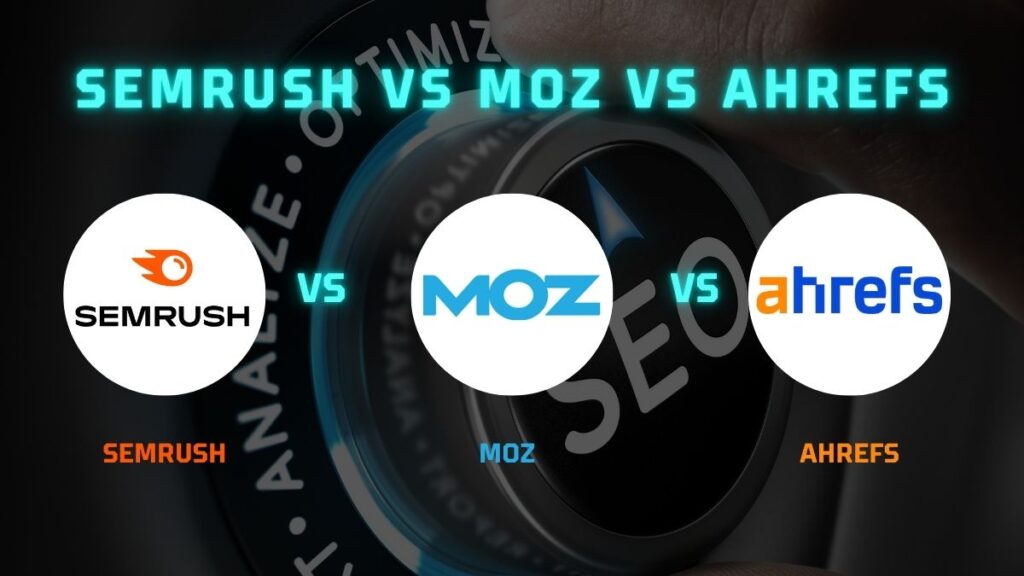Compare Semrush vs Moz vs Ahrefs to find the best SEO tool for your website. Learn how each helps with keywords, backlinks, and tracking competitors to grow your site’s ranking!
When it comes to SEO tools, Semrush, Moz, and Ahrefs are three of the most popular choices. But how do they compare in real-world scenarios? Whether you’re a beginner or an experienced SEO professional, this detailed comparison will help you make an informed decision.
We’ll cover each tool’s core features, user interface, data accuracy, pricing plans, customer support, and best use cases, with examples of how each tool can solve real SEO problems. Plus, we’ll dive into the important question: Which is better, Ahrefs or Semrush?
Semrush
Semrush is an all-in-one SEO tool used by businesses of all sizes, especially larger ones. It’s great for managing all aspects of SEO and digital marketing.
Key Features
- Keyword Research: Find high-performing keywords for your site.
- Competitor Analysis: See what your competitors are doing to stay ahead.
- Site Audits: Identify and fix issues on your website.
- Position Tracking: Track your rankings for specific keywords over time.
- Backlink Analysis: Monitor backlinks to improve your site’s authority.
- Content Marketing Tools: Help with content creation and optimization.
Moz
Moz is a simpler SEO tool mainly used by smaller businesses or beginners. It focuses on providing easy-to-understand insights without a steep learning curve.
Key Features
- Keyword Research: Find keyword opportunities for your site.
- Rank Tracking: Track how your site ranks for specific keywords.
- On-Page Optimization: Get suggestions for improving your web pages.
- Link Explorer: Analyze backlinks and find opportunities for building links.
- Site Crawl: Find technical SEO issues on your site.
Ahrefs
Ahrefs is best known for its backlink analysis and in-depth competitor research. It’s mostly used by SEO professionals who need detailed data.
Key Features
- Backlink Analysis: Explore your backlinks and competitors’ backlinks in detail.
- Site Audits: Check your website for SEO issues.
- Keyword Research: Find keywords to rank for and analyze their difficulty.
- Content Explorer: Discover popular content and analyze what makes it successful.
- Rank Tracking: Monitor your rankings for specific keywords.
Semrush vs Moz vs Ahrefs
Here are the comparison among Semrush vs Moz vs Ahrefs
Keyword Research
Semrush: The Keyword Magic Tool is one of the most robust keyword research features. For example, if you run a blog about fitness and want to rank for “home workout routines,” Semrush will give you keyword suggestions, volume data, competition level, and long-tail keyword ideas like “best home workout routines for beginners.”
Moz: Moz’s Keyword Explorer is easy to use for beginners. If you’re an e-commerce store owner selling eco-friendly products, Moz will suggest keywords like “sustainable home products” along with their difficulty and search volume. However, its database isn’t as vast as Semrush’s.
Ahrefs: Ahrefs is known for its Keywords Explorer tool, ideal for deeper competitive research. For instance, if you’re working in the tech industry, Ahrefs will help you discover low-competition keywords like “best budget smartphones 2024,” along with keyword difficulty scores.
Pro Tip: Use Semrush for the most detailed keyword research. If you’re new to SEO, try Moz for an easier experience.
Site Audits
Semrush: Say you own a travel blog, and you’re getting fewer organic visitors than expected. Using Semrush’s Site Audit tool, you might discover issues like slow page speed or crawl errors, preventing Google from indexing your pages effectively.
Moz: If you have a local bakery website, Moz’s Site Crawl tool will help you identify broken links and technical issues, but it might miss out on deeper, more advanced problems that Semrush or Ahrefs would catch.
Ahrefs: Let’s say you’re running a news site, and your rankings are dropping. Ahrefs’ Site Audit feature would pinpoint problems such as unoptimized meta tags, missing alt texts, or issues with internal linking, providing detailed solutions.
Pro Tip: Semrush is great for finding both simple and complex site issues. For small sites, Moz is easier, while Ahrefs gives deeper technical insights.
Backlink Analysis
Semrush: If you’re a B2B service provider and want to understand how competitors are building backlinks, Semrush allows you to analyze your competitors’ backlink profile in-depth, helping you replicate their strategy.
Moz: Moz’s Link Explorer is great for small businesses to analyze their backlinks. For instance, a restaurant owner could use Moz to check for local backlinks from food blogs or directories.
Ahrefs: Ahrefs is unmatched in backlink analysis. For example, a tech startup looking to get backlinks from major industry websites will find Ahrefs invaluable. The Site Explorer shows which domains are linking to your competitors and gives you actionable insights on how to acquire similar backlinks.
Pro Tip: Ahrefs is the best for detailed backlink research. Moz is simpler if you’re just starting out.
Rank Tracking
Semrush: If you’re a digital marketer managing a client’s website, Semrush’s Position Tracking tool will let you track keyword rankings across various locations and devices. For example, tracking how a keyword like “best SEO tools” is performing globally and regionally.
Moz: Moz offers Rank Tracker to track keyword positions and provides monthly reports. A small business owner can use it to check how their target keywords, such as “custom t-shirts,” are performing over time.
Ahrefs: Ahrefs provides real-time rank tracking, allowing you to see how your target keywords are performing instantly. For example, tracking “SEO for bloggers” to see if your rankings improve after a content update.
Pro Tip: For real-time keyword tracking, go with Ahrefs. Semrush is great for tracking on a global scale, and Moz works well for simpler tracking.
User Interface
Ease of use matters, especially for beginners:
Semrush: Semrush’s dashboard is packed with tools, which may seem overwhelming at first. However, once you’re familiar with the layout, you can easily access keyword research, site audits, and backlink analysis.
Moz: Moz offers one of the cleanest, simplest interfaces, perfect for beginners. If you’re just starting out, it’s very easy to access the main features like keyword research and link tracking without a steep learning curve.
Ahrefs: Ahrefs’ interface is minimalist and intuitive. It’s less cluttered than Semrush, but it can take some time to learn how to navigate its advanced features effectively. However, the simplicity in layout makes it ideal for users who want a balance of depth and accessibility.
Pro Tip: Moz is easiest for beginners. If you want more features, try Ahrefs, which is simple but powerful.
Data Accuracy
Real SEO decisions depend on accurate data:
Semrush: Offers real-time and reliable data, especially in keyword research. For instance, when tracking “SEO tools” trends, Semrush’s results are backed by extensive data points and accurate competition analysis.
Moz: While Moz’s data is accurate, it often lags behind Semrush and Ahrefs in terms of keyword volume and competition insights. It’s better suited for smaller, more niche SEO campaigns.
Ahrefs: Known for its exceptional data accuracy, Ahrefs’ backlink data is considered one of the most reliable in the industry. For example, it can track backlinks from high-authority websites that might not appear in Semrush or Moz.
Pro Tip: Ahrefs is best for accurate backlinks. Semrush is great for keyword data, too.
Pricing Plans
Choosing the right pricing plan depends on your needs:
Semrush: Pricing starts at $129.95/month for the Pro plan, offering essential tools like keyword research and site audits. If you need more advanced features, the higher-tier plans can cost up to $449.95/month.
Moz: Starts at $99/month for the Standard plan, which includes keyword research, site audits, and backlink analysis. Moz is generally more affordable for beginners but less feature-rich than Semrush and Ahrefs.
Ahrefs: The Lite plan starts at $99/month, providing core tools like keyword research, site audits, and backlink analysis. Ahrefs is often seen as more expensive compared to Moz but is very powerful for competitive analysis.
Pro Tip: If you’re on a budget, Moz is affordable. For more advanced tools, Semrush or Ahrefs are worth the price.
| Must Check: mass media vs social media |
Customer Support
Reliable support can help when issues arise:
Semrush: Offers 24/7 support via live chat, email, and phone (for higher-tier plans). Semrush’s extensive knowledge base is another helpful resource.
Moz: Provides responsive support via email and a vibrant community forum. They offer dedicated support channels for paid plans but are not as fast as Semrush.
Ahrefs: While Ahrefs lacks live chat support, its email support is fast and efficient, with a comprehensive help center to guide you through common problems.
Pro Tip: Semrush offers 24/7 support. Moz has a helpful community, and Ahrefs has fast email support.
Best Use Cases
Understanding which tool is best for specific scenarios:
Semrush: Ideal for comprehensive SEO strategies. If you’re managing SEO for an e-commerce website, Semrush’s advanced tools for keyword research, competitor analysis, and PPC can give you a competitive edge. Why is Semrush better than Moz? It offers more robust features and broader toolsets for enterprises.
Moz: Best for beginners or small businesses. If you’re a local restaurant looking for an easy-to-use SEO tool to improve your local rankings, Moz is a solid choice.
Ahrefs: The go-to tool for backlink analysis. If you’re running a digital marketing agency focused on link-building campaigns, Ahrefs’ backlink data and Site Explorer are essential for your work. Semrush vs Moz vs Ahrefs Reddit discussions often show that Ahrefs excels in competitive backlink research.
Pro Tip: Semrush is best for big SEO campaigns. Moz is great for beginners, and Ahrefs excels in backlink analysis.
Real-World Example
Let’s look at a real-world example for each:
Semrush: A content marketer using Semrush might discover that their competitor for a keyword like “how to bake cookies” is ranking for thousands of related long-tail keywords. Semrush helps you find these keywords and optimize your blog to target less competitive terms.
Moz: A local SEO expert using Moz could discover through Site Crawl that their client’s website has broken internal links that prevent Google from properly indexing their service pages. Moz’s easy-to-read reports help solve these issues quickly.
Ahrefs: A link-building expert using Ahrefs may analyze their competitor’s backlink profile and find that they have backlinks from major industry publications like TechCrunch. Ahrefs’ detailed backlink reports help identify where to get similar high-quality links.
Pro Tip: Use Semrush to find keyword opportunities. Moz helps fix quick site issues, and Ahrefs is perfect for backlink research.
Screenshots and Visuals
Including visuals makes the comparison more engaging:
Semrush: The Position Tracking dashboard lets you see your rankings over time in a visually appealing graph, making it easier to track your SEO progress.
Moz: The Keyword Explorer shows a simple, clear graph with keyword difficulty, search volume, and opportunity, helping beginners visualize keyword data.
Ahrefs: The Site Explorer shows a visual representation of backlink growth, helping SEO professionals quickly understand link acquisition trends.
Pro Tip: Semrush has detailed graphs for tracking keywords. Moz offers clear, simple graphs. Ahrefs is great for visualizing backlinks.
Stay Up-to-Date
These tools are constantly evolving, so it’s important to stay informed:
Semrush regularly updates its keyword database and features, adding more detailed data for international SEO and content optimization.
Moz has introduced updates to MozBar and Rank Tracker to improve usability and support for mobile SEO.
Ahrefs frequently updates its backlink data to ensure the most current information for competitive analysis.
Pro Tip: Keep up with Semrush and Ahrefs for frequent updates. Moz also improves its tools regularly.
Comparison Table: Semrush vs Moz vs Ahrefs
Have a quick look at this comparison table to pick the best one among Semrush, Moz and Ahrefs
| Feature | Semrush | Moz | Ahrefs |
| Keyword Research | Keyword Magic Tool, Keyword Gap Tool | Keyword Explorer, SERP analysis | Keywords Explorer, Keyword difficulty scores |
| Site Audits | Detailed site health check, crawl issues, errors | Basic site audits, limited crawl depth | Site Audit, in-depth analysis and reports |
| Backlink Analysis | Advanced backlink analysis, backlink gap tool | Link Explorer, simple backlink tracking | Site Explorer, extensive backlink database |
| Rank Tracking | Position Tracking, multiple location support | Rank Tracker, keyword positions by location | Rank Tracker, real-time ranking updates |
| Data Accuracy | Real-time data, reliable keyword volume | Accurate for basic needs, but less granular | High-accuracy backlink data and keyword data |
| Ease of Use | Beginner to advanced users, robust interface | Simplified for beginners, easy-to-navigate | Clean interface, but can be complex for newbies |
| Customer Support | 24/7 support (higher plans) + Knowledge Base | Email support + Moz Community | Email support + Knowledge Base |
| Pricing | Starts at $129.95/month | Starts at $99/month | Starts at $99/month |
Company Usage
Let’s have a close look at the number of companies using each of these tools for their digital marketing operations:
Semrush
Semrush is widely used by agencies, marketers, and enterprises that need an all-in-one SEO solution with a broad range of features. Some notable brands using Semrush include:
- eBay: eBay uses Semrush for competitive analysis and keyword research.
- BMW: BMW leverages Semrush for its SEO and digital marketing efforts.
- Philips: Philips uses Semrush for content marketing and improving its organic reach.
- Quora: Quora uses Semrush to monitor SEO performance and improve content strategy.
Industry Sectors: E-commerce, Tech, Automotive, Real Estate, and more.
Moz
Moz is favored by small businesses and startups due to its user-friendly interface and affordability. It’s commonly used for basic SEO tasks like keyword research, rank tracking, and link analysis. Some brands that have publicly shared their use of Moz include:
- The Home Depot: They have used Moz Pro for keyword tracking and rank monitoring.
- Zillow: Zillow has utilized Moz for backlink analysis and SEO tracking.
- Sony Music: Sony uses Moz for content optimization and improving their digital footprint.
Industry Sectors: Small businesses, Startups, Retail, Music, etc.
Ahrefs
Ahrefs is particularly known for its powerful backlink analysis and is used by companies that need deep insights into their backlink profiles and competitors’ SEO strategies. Some notable companies using Ahrefs are:
- Spotify: Spotify uses Ahrefs for backlink tracking and competitor research.
- Netflix: Netflix relies on Ahrefs for backlink and keyword research to support its SEO strategies.
- Adobe: Adobe uses Ahrefs for keyword analysis and competitive SEO research.
- Uber: Uber has used Ahrefs to improve its content and backlink strategy.
Industry Sectors: Media, Tech, E-commerce, SaaS, etc.
Statistical Comparison
Here is the statistical comparison of the usage of these tools that will help you to get better idea:
| Metric | Semrush | Moz | Ahrefs |
| Keyword Database Size | 20+ billion keywords | 500 million keywords | 10+ billion keywords |
| Backlink Database Size | 43 trillion backlinks | 40+ trillion backlinks | 400+ trillion backlinks |
| Accuracy Rate of Keyword Data | 95% accuracy in global search data | 90% accuracy in global search data | 98% accuracy in backlinks and keywords |
| Monthly Active Users | 7 million+ | 1 million+ | 5 million+ |
| Support Response Time | Within 24 hours | Within 48 hours | Within 24 hours |
| Global Reach | Available in 142 countries | Available in 30 countries | Available in 150+ countries |
| Content & SEO Reports | Detailed reporting, customizable | Basic reports, visual data | Advanced SEO reports, highly detailed |
The Most Common Doubts
Here are some common dounts answered:
Which is better, Ahrefs or Semrush?
If you need an all-in-one SEO tool, Semrush is probably the better choice. It has a lot of features like keyword research, site audits, and competitor analysis to cover every part of your SEO strategy. But if you’re mostly focused on backlink analysis, Ahrefs is the better option with its detailed backlink data and tools.
Why is Semrush better than Moz?
Semrush offers more tools, like advanced keyword research and competitor analysis, making it a stronger choice than Moz. Moz is simpler and great for beginners, but Semrush is better for experienced SEO users who need more detailed data and features.
Conclusion
In conclusion, choosing the right tool—Ahrefs, Semrush, or Moz—depends on your specific SEO needs and the size of your business:
- Semrush is ideal for larger companies or agencies. It offers a comprehensive suite of features, from keyword research to site audits, making it perfect for handling large, complex SEO projects and managing multiple websites at once.
- Moz is a great option for small businesses or startups. It’s simple to use, affordable, and offers essential features like rank tracking and on-page optimization, making it a great choice for those who are new to SEO or have limited budgets.
- Ahrefs is favored by SEO professionals who need deep insights into backlinks and competitor analysis. It’s known for its strong backlink database and detailed research tools, which help users improve their SEO strategies by analyzing competitors and identifying link-building opportunities.
Though each tool targets different users, many businesses choose to use more than one depending on their specific needs. Combining tools can provide a more complete SEO strategy by covering a wider range of features and insights.


